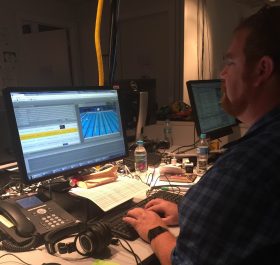This is the fifth Olympic games that Max Negin, an assistant professor of communications, has worked on with NBC Sports.
During the Olympic Games now underway in Rio de Janeiro, NBC Sports will collect more than 6,000 hours of footage of athletes competing — from high-profile sports such as basketball, swimming and gymnastics, to those with less of a following, like fencing and table tennis.

“A lot of what I do is assisting other people so they can do their jobs,” Negin said in a Skype interview this week from Rio. “The beauty of NBC is it’s the best of the best, and there are lots of folks there who are at the top of their games in doing their jobs.”
Negin’s official title is “digital media manager” — one that speaks to how his role has changed since he first began working at the Olympics in Beijing in 2008. Earlier, most of the action was captured on tape, which of course had an editing and distribution process different from how digital media is handled.
“There used to be tapes all over the place. …. Now, you have to pull it out of this giant vat of data,” Negin said. “Normally, it works perfectly.”
And when it doesn’t, it takes quick thinking and manual changes to ensure the files are found and distributed to those who need them, he said. Many of the programs and systems used for the broadcast are being tweaked and rewritten during the games, he said.
“The live part of it makes it more challenging,” said Negin, who noted that several previous Olympic games he worked on had a delayed broadcast due to the differences in time zones.
“In a live event, we don’t know if (Michael) Phelps is going to win or what may happen,” he said. “You’re sort of trying to do a controlled fall off a cliff and land on your feet. … But these are folks who have done this many, many times. Everyone is coaching, coaching, coaching, and NBC doesn’t allow for them not to be prepared.”
As proof of that high-caliber work, Negin and the rest of the NBC Sports team brought home an Emmy for its coverage of the 2012 Olympic Games in London.
It’s the evolution — of the Olympics themselves, and how the competitions are recorded, edited and broadcast — that keep Negin coming back.

Beyond the experience of working on the broadcast are the connections that Negin is able to make while involved with the NBC, and then tap into when he returns to Elon. For instance, Negin will be teaching a sports broadcasting course, with these experts involved with producing the biggest global sporting event of the year “just an email or a phone call away.”
“I can go sit in the back of a control room or a studio, and see how folks are interacting, with the opportunity to sit and talk with editors and producers and directors,” Negin said. “Being here gives me a front-row seat to people who are at the top game in producing live television.”


